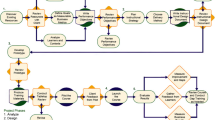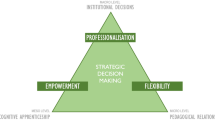Abstract
The proliferation and expansion of massive open online courses (MOOCs) prompts a need to revisit classical pedagogical questions. In what ways will MOOCs facilitate and promote new e-learning pedagogies? Is current learning design adequate for the “massiveness” and “openness” of MOOCs? This article discusses the ways in which MOOCs create new conditions for designing learning processes. The authors present various theoretical approaches to learning design and discuss a combination of theoretical perspectives. They discern a fragmentation of the teacher role; where the teacher was once the main person responsible for planning, practice and reflection, those activities may now be performed by different actors with different areas of responsibility. The theoretical discussion is complemented by a review of recent studies of new practices and design formats aiming to overcome the upscaling issues of MOOCs. The authors present a multifaceted picture of MOOC methodologies, including a typology of hybrid approaches to MOOC design. Through the example of MOOC implementation in India, they address the integration of MOOCs into formal higher education systems. They conclude their article with the contention that, through upscaling, important facets of students’ intellectual development and critical thinking might be left to the students themselves. This may cause problems. Adequate scaffolding from a teacher, such as adapting activities to the specific situation, might be needed to develop the skills required to be a self-directed learner. Furthermore, upscaling seems to promote a separation of the formerly unified teacher functions of planning, teaching and assessing, which necessitates increased collaboration among the many new actors in the field of pedagogy.
Résumé
Multiplier le nombre d’apprenants, fragmenter le rôle des enseignants : comment les formations en ligne ouvertes à tous (FLOT) créent de nouvelles conditions pour la conception pédagogique – La prolifération et l’expansion des formations en ligne ouvertes à tous (FLOT) entraînent la nécessité de réexaminer les questions pédagogiques classiques. Dans quelle mesure les FLOT faciliteront et favoriseront-elles de nouvelles pédagogies d’apprentissage électronique ? La conception pédagogique actuelle se prête-t-elle à la « massivité » et à l’« ouverture » des FLOT ? Cet article examine de quelles manières les FLOT créent de nouvelles conditions pour la conception des processus d’apprentissage. Les auteurs présentent diverses approches théoriques de la conception pédagogique et analysent un ensemble de perspectives théoriques. Ils perçoivent une fragmentation du rôle de l’enseignant : si celui-ci était autrefois principal responsable de la programmation, de la pratique et de la réflexion, ces activités peuvent aujourd’hui être assumées par différents acteurs investis de différents domaines de responsabilité. L’analyse théorique est complétée par un recensement des études récentes sur les nouvelles pratiques et formes de conception visant à résoudre les problèmes d’échelle des FLOT. Les auteurs présentent une image pluridimensionnelle des méthodologies des FLOT, dont une typologie d’approches hybrides pour leur conception. À travers l’exemple de la réalisation des FLOT en Inde, ils abordent la question de leur intégration dans les systèmes formels d’enseignement supérieur. Ils concluent leur article par l’affirmation qu’en raison de la massification, d’importants aspects du développement intellectuel et de la pensée critique pourraient être abandonnés aux seuls étudiants. Cette tendance pourrait créer des problèmes. Un soutien approprié de la part de l’enseignant, tel que des activités d’adaptation à la situation spécifique, pourrait être requis pour développer les compétences nécessaires à un apprenant auto-dirigé. En outre, la massification semble favoriser une séparation des fonctions auparavant concentrées chez l’enseignant, à savoir programmation, enseignement et évaluation, ce qui nécessite une coopération accrue entre les nombreux nouveaux acteurs présents sur la scène pédagogique.
Similar content being viewed by others
Notes
SWAYAM is an acronym for “Study Webs of Active learning for Young Aspiring Minds”; also, the Hindi word swayam means “self”.
The Education and Research Hub for Lifelong Learning of the Asia–Europe Meeting (ASEM LLL Hub), is an official network of Asian and European higher education institutions. The research group focusing on the “Development of ICT skills, e-learning and the culture of e-learning in LLL” is one of five networks within the research hub. For more information, see http://asemlllhub.org/aboutus/ [accessed 6 March 2018].
For more information on India’s National Mission on Education through Information Communication Technology (NME-ICT) programme, see http://mhrd.gov.in/technology-enabled-learning-0 [accessed 6 March 2018].
References
Anders, A. (2015a). Theories and applications of massive online open courses (MOOCs): The case for hybrid design. International Review of Research in Open and Distributed Learning, 16(6), 39–61.
Anders, G. (2015b). India loves MOOCs. MIT Technology Review, 27 July [online article]. Retrieved 23 January 2018 from https://www.technologyreview.com/s/539131/india-loves-moocs/.
Anderson, T. (Ed.). (2008). The theory and practice of online learning (2nd edn). Edmonton, AB: Athabasca University Press. Retrieved 3 June 2015 from http://www.aupress.ca/index.php/books/120146.
Andreasen, L. B., & Buhl, M. (2015). Understanding MOOCs through connectivist and social constructivist approaches. In A. Jefferies & M. Cubric (Eds.), Proceedings of the 14th European conference on e-learning, ECEL-2015 (pp. 34–41). Reading, UK: Academic Conferences Ltd.
Bang, J., Dalsgaard, C., Kjaer, A., & O’Donovan, M. (2016). Building OOC layers on top of existing courses. In D. Jansen & L. Konings (Eds.), MOOCs in Europe: Overview of papers representing a collective European response on MOOCs as presented during the HOME conference in Rome November 2015 (pp. 9–13). Maastricht: European Association of Distance Teaching Universities (EADTU).
Bayne, S., Knox, J., & Ross, J. (2015). Open education: The need for a critical approach. Learning, Media and Technology, 40(3), 247–250.
Beetham, H. (2013). Designing for active learning in technology-rich contexts. In H. Beetham & R. Sharpe (Eds.), Rethinking pedagogy for a digital age. Designing for 21st century learning (2nd edn., pp. 26–40). New York, NY: Routledge.
Breslow, L. (2016). MOOC research: Some of what we know and avenues for the future. In L. Engwall, E. D. Corte, & U. Teischler (Eds.), Emerging models of learning and teaching in higher education: From books to MOOCs (pp. 57–67). London: Portland Press Limited.
Buhl, M. (2016). Theory-generating practice. Proposing a principle for learning design. Tidsskriftet Læring og Medier (LOM), 9(15), 1–21.
Buhl, M., & Andreasen, L. B. (2016). MOOCs – The promise of meeting the need of flexibility for the adult learner? In J. Novotna & A. Jarcarik (Eds.), Proceedings of the 15th European conference on e-learning, ECEL-2016 (pp. 98–104). Reading: Academic Conferences Ltd.
Dale, E. L. (1989). Pedagogisk profesjonalitet [Pedagogical professionalism]. Oslo: Gyldendal.
GoI (Government of India). (2016). Guidelines for development and implementation of MOOCs (F. No. 8-1/2015-TEL). New Delhi: Ministry of Higher Education, Department of Higher Education. Retrieved 6 March 2018 from http://www.sakshat.ac.in/officeDocumentUploaded/2016-04-11/GuidelinesforDevelopmentandImplementationofMOOCsOn11.03.2016.pdf.
Hodges, C., Lowenthal, P., & Grant, M. (2016). Teacher professional development in the digital age: Design considerations for MOOCs for teachers. In G. Chamblee & L. Langub (Eds.), Proceedings of society for information technology & teacher education international conference 2016 (pp. 2075–2081). Savannah, GA: Association for the Advancement of Computing in Education (AACE).
Hopmann, S., & Gundem, B. B. (1998). Didaktik and/or curriculum: An international dialogue. New York: Peter Lang Publishing.
Jank, W., & Meyer, H. (1991). Didaktische Modelle [Didactic Models]. Cornelsen Scriptor: Frankfurt a. M.
Jansen, D., & Konings, L. (2016). MOOCs in Europe: Overview of papers representing a collective European response on MOOCs as presented during the HOME conference in Rome November 2015. Maastricht: European Universities of Distance Education (EADTU). Retrieved 5 March 2018 from https://eadtu.eu/images/publicaties/MOOCs_in_Europe_November_2015.pdf.
Kim, B. (Ed.). (2015). MOOCs and educational challenges around Asia and Europe. Seoul: Korea National Open University (KNOU) Press.
Klafki, W. (2001 [1985]). Dannelsesteori og didaktik. Nye Studier [Formation theory and didactics; original German title: Neue Studien zur Bildungstheorie und Didaktik]. Aarhus: Klim.
Knowles, M. S. (1972). Toward a model of lifelong education. Working paper for Consultative Group on “Concept of Lifelong Education and its Implications for School Curriculum”, 9–12 October. Hamburg: UNESCO Institute for Education. Retrieved 23 January 2018 from https://files.eric.ed.gov/fulltext/ED066632.pdf.
Knowles, M. S., Holton, E. F., & Swanson, R. A. (1998). The adult learner: The definitive classic in adult education and human resource development (5th ed.). Houston: Gulf Publishing Company.
Mayes, T. & de Freitas, S. (2013). Technology-enhanced learning. The role of theory. In H. Beetham & R. Sharpe (Eds.), Rethinking pedagogy for a digital age: Designing for 21st century learning (2nd edn, pp. 13–25). New York: Routledge.
Mor, Y., Craft, B., & Maina, M. (2015). Introduction: Learning design: Definitions, current Issues and grand challenges. In M. Maina, B. Craft, & Y. Mor (Eds.), The art & science of learning design (pp. ix–xxvi). Rotterdam: Sense Publishers.
P21 (Partnership for 21st Century Learning). (2015). P21 Framework Definitions. http://www.p21.org.
Pushpanadham, K. (2015). Universalizing university education: MOOCs in the era of knowledge based society. In B. Kim (Ed.), MOOCs and educational challenges around Asia and Europe (pp. 21–33). Seoul: Korea National Open University (KNOU) Press.
Ross, J., Sinclear, C., Knox, J., Bayne, S., & Mcleod, H. (2014). Teacher experiences and academic identity: The missing components of MOOC pedagogy. MERLOT Journal of Online Learning and Teaching, 10(1), 57–69.
Schön, D. A. (1983). The reflective practitioner. How professionals think in action. London: Temple Smith.
Siemens, G. (2005). Connectivism: A learning theory for a digital age. International Journal of Instructional Technology and Distance Learning, 2(1), 3–10. Retrieved 23 January 2018 from http://www.itdl.org/Journal/Jan_05/article01.htm.
Stoyanov, S., Sloep, P., De Bie, M., & Hermans, V. (2014). Teacher-training, ICT, Creativity, MOOC, Moodle—What pedagogy? In L. Gómez Chova, A. López Martínez, & I. Candel Torres (Eds.), EDULEARN14 Proceedings 6th international conference on education and new learning technologies (pp. 5678–5686). Valencia: International Academy of Technology, Education and Development (IATED).
Acknowledgements
This article was developed within the framework of the ASEM Education and Research Hub for Lifelong Learning (ASEM LLL Hub) Research Network 1: Development of ICT skills, e-learning and the culture of e-learning in Lifelong Learning (e-ASEM).
Author information
Authors and Affiliations
Corresponding author
Rights and permissions
About this article
Cite this article
Buhl, M., Andreasen, L.B. & Pushpanadham, K. Upscaling the number of learners, fragmenting the role of teachers: How do massive open online courses (MOOCs) form new conditions for learning design?. Int Rev Educ 64, 179–195 (2018). https://doi.org/10.1007/s11159-018-9714-1
Published:
Issue Date:
DOI: https://doi.org/10.1007/s11159-018-9714-1




